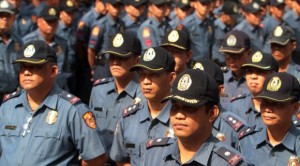WITH an estimated 25 million students returning to schools next month, the Philippine National Police has laid out its nationwide security and public safety plan ahead of the June 1 school opening.
On orders of PNP officer in charge Deputy Director General Leonardo Espina, the PNP Directorate for Operations has issued the operational guidelines for “Oplan Ligtas Balik-Eskwela 2015” that will mobilize all regional offices and national support units.
Spokesperson Senior Superintendent Bartolome Tobias said the PNP is also conducting periodic assessment to determine whether a specific police unit should upgrade alert condition in its area.
Espina gave police regional directors the discretion to raise alert conditions if they find it necessary.
Like in previous years, the PNP’s priority concern this school opening is to prevent street crimes such as pickpocket, snatching, swindling, robbery, and street-level drug trafficking.
Espina also ordered the PNP to designate a personnel to address bullying inside and outside school premises in coordination with school officials.
“Police will also be on the look-out for drug traffickers and violent street gangs that may infiltrate the ranks of students,” he said.
In Metro Manila, the National Capital Region Police Office vowed to sweep the university belt (U-belt) of criminal elements as it fields all its 24,000 personnel near schools for foot, mobile and police visibility patrols.
Police Director Carmelo Valmoria, NCRPO director, said Metro Manila police would be augmented by Barangay (village) Peacekeeping Action Teams.
Police assistance desks manned by police and BPAT personnel will be set up near schools and universities in the region.
The NCRPO, in coordination with the Department of Transportation and Communications and the Metro Manila Development Authority, will also facilitate traffic management operations near schools.
“Local PNP units were instructed to coordinate closely with school administrators and officials of the Department of Education, Commission of Higher Education, local government units, Parent-Teachers Associations and other concerned agencies to ensure safety and security of students,” Tobias added. AC



